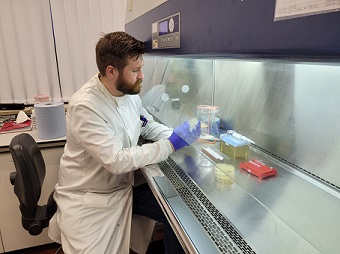CEB in the Media
Innovation in the recycling industry
Gwion Williams, an early career researcher of plastic biodegradation at the Centre of Environmental Biotechnology was quoted in a BBC Wales News article about a project to trial using nappies to make roads.

The project is being piloted in Wales, and it could mean fewer nappies are thrown into landfill. Fibre from nappies is added to bitumen glueing together asphalt road surfaces. NappiCycle Ltd. partnered with the Welsh government to use plastic fibres from dirty diapers to resurface a 2.2-kilometre stretch of the A487 highway between Aberystwyth and Cardigan in Ceredigion, Wales.
"The fact that to date only 8% of plastic that has ever been produced has been recycled, and only 1% is actually in secondary use goes to show that the solutions we have at the moment are just not good enough," said Mr Williams.
More details are in the following CBC story. Gwion thinks the nappy road project is a "very nifty idea" that follows the "circular economy" of plastics, which reuses plastic waste for something new.
Publication date: 7 March 2022
Illicit drug waste found in river during Glastonbury festival
The study, which revealed that environmentally damaging levels of illicit drugs had been found in the river that runs through the Glastonbury festival site made headline news across the globe (28 September).
Led by Dr Christian Dunn, School of Natural Sciences, with Masters student Dan Aberg and Dr Daniel Chaplin from the Centre for Environmental Biotechnology the study was featured on major media outlets including the BBC, The Guardian, The Times, CNN, Sky News and The Telegraph. Christian and Dan also took part in radio and tv interviews including GB News, BBC5 Live, BBC Points West, BBC Wales Today and Times Radio. The research was mentioned on national news bulletins throughout the day including BBC Radio Two’s Zoe Ball Breakfast Show and the BBC One o Clock News.
The story has been shared extensively on social media from media companies such as Unilad, who have 42M followers, CNN, who have 34M followers and, IFL Science who have 24M followers on Facebook. ‘Glastonbury’ trended on Twitter and the story was listed as ‘most read’ news item on the main BBC website for part of the day.
“Dan Aberg, a masters student in the School of Natural Sciences, Bangor University, worked with Dr Daniel Chaplin from the Centre for Environmental Biotechnology (CEB) to gather the samples.”
“Dan Aberg, a Masters student at the School of Natural Sciences at Bangor University and Dr Daniel Chaplin from the Centre for Environmental Biotechnology (CEB) measured levels of illicit drugs before, during and after the Glastonbury Festival in 2019, when it was last held.”
“Dan Aberg, who is a masters student at Bangor University, worked with Dr Daniel Chaplin from the Centre for Environmental Biotechnology (CEB) on the study.”
Publication date: 28 September 2021
Bangor University’s New Centre for Biotechnology
By Charlotte Bilsby on November 17, 2018
The doors of Bangor University’s Centre for Environmental Biotechnology (CEB) have finally opened. The opening of CEB has placed Bangor University’s research at the cutting edge of research. The research centre aims to discover new enzymes with the potential to transform the efficiency of current biotechnology industries. The centre will be looking at extremophiles and how they can be used within industrial processes. Most industrial sectors such as pharmaceuticals, energy and cosmetics use inefficient chemical synthesis processes, which require high energy consumption and organic solvents, which are damaging to the environmental and public health. CEB aims to replace chemical synthesis by identifying, developing and testing biological catalysts (enzymes) taken from extremophiles.
Due to these extreme microorganisms being exposed to such harsh living conditions such as high temperatures, varying salinity and acidity, the enzymes are already well suited to work in the conditions created in industrial processes. Using these enzymes will reduce energy consumption, pollution and cost. All of which will benefit key sections of scientific research such as life sciences, pharmaceuticals and chemical manufacturing.
Professor Peter Golyshin, a professor of Biotechnology at Bangor University and Co-director of the new centre has said:
“This new Centre provides a great opportunity to combine the university’s cutting-edge staff expertise in bioanalytics with our leading expertise in microbiology and genomics of extremophiles and enzyme discovery and applications. Enabling this team to work in a new centre with state-of-the-art research instruments the Centre will lead to major new discoveries about how extremophiles can survive at the limits to life and how we can harness this capacity to achieve breakthroughs in the efficiency and environmental sustainability of many industrial processes.”
The centre is located within the University’s School of Natural Sciences. The centre has received £5m of EU funding through the Welsh Government and will positively impact the local economy and boost the region’s capacity work cohesively with industry and further develop this rapidly-emerging sector.https://www.seren.bangor.ac.uk/other/2018/11/17/bangor-universitys-new-centre-for-biotechnology/s
Opening of new Bangor University biotechnology research centre
A research centre that will discover new enzymes with the potential to transform the efficiency of biotechnology industries has just been opened in the presence of research scientists from across Europe, industry representatives and officials from the Welsh Government.
The Centre for Environmental Biotechnology (CEB) places Bangor University at the cutting edge of research into how unusual microorganisms that live in extreme environments (called “extremophiles”) can be used to make industrial processes and products “greener”. The CEB facility will provide state-of-the-art equipment and world-leading expertise for identifying and isolating enzymes from extremophiles.

(L-R) Baudewijn Morgan (WEFO), Prof John Healey (School of Natural Sciences), Prof Colin Jago (School of Ocean Sciences), Prof John G Hughes (Vice-Chancellor), Prof Bela Paizs and Prof Peter Golyshin (both CEB Co-Directors)
At present, many industrial sectors such as food, pharmaceuticals, fine chemicals, cosmetics, energy and new materials use inefficient chemical synthesis processes. These require high energy consumption and use of organic solvents that are damaging to health and the environment. This imposes high costs on these industries.
To replace chemical synthesis with environmentally friendly processes CEB will identify, develop and test biological catalysts (enzymes) from extremophiles. Because these microorganisms are able to live under harsh conditions of high temperature, salinity or acidity, their enzymes are very well suited to work in the extreme conditions of an industrial process. This will reduce the energy use, pollution and costs of key sectors of the economy, such as life sciences, pharmaceuticals and chemical manufacturing.
Speaking at the launch, Professor Peter Golyshin, Professor of Biotechnology at Bangor University and Co-Director of the new centre, said: “This new Centre provides a great opportunity to combine the university’s cutting-edge staff expertise in bioanalytics with our leading expertise in microbiology and genomics of extremophiles and enzyme discovery and applications. Enabling this team to work in a new centre with state-of-the-art research instruments the Centre will lead to major new discoveries about how extremophiles can survive at the limits to life and how we can harness this capacity to achieve breakthroughs in the efficiency and environmental sustainability of many industrial processes.”
The Centre, located at the University’s School of Natural Sciences, has received £5m of EU funding through the Welsh Government and will boost the region’s capacity to work with industry and to further develop this rapidly-emerging sector.
Welcoming this latest development to Bangor University’s research portfolio, Welsh Government Cabinet Secretary for Economy and Transport, Ken Skates AM said:
“It’s fantastic to see this cutting edge facility up and running. Another feather in the cap of Bangor University, it will provide ground-breaking research in this this rapidly expanding global sector, encouraging inward investment and ensuring Wales takes full advantage of future opportunities.
“It’s important, too, to recognise that this has all been made possible thanks to £5m of EU funding, which continues to play such an important role in supporting growth, innovation and jobs across Wales. It’s absolutely vital to so many of our sectors and institutions that we see replacement funding from the UK Government after we leave the EU.”
Publication date: 16 October 2018
